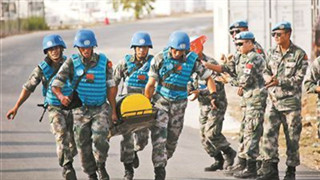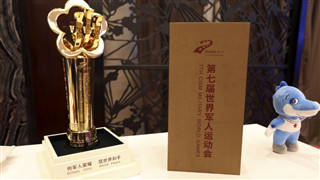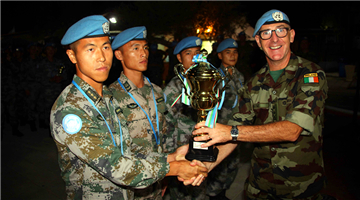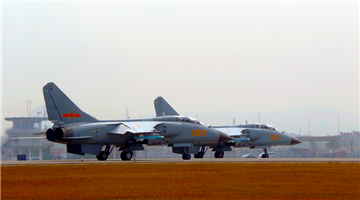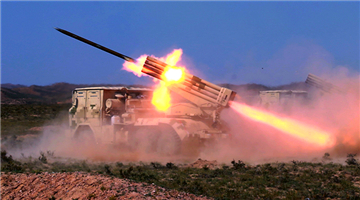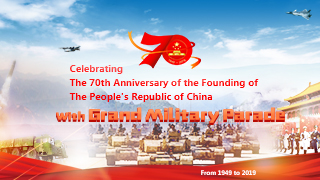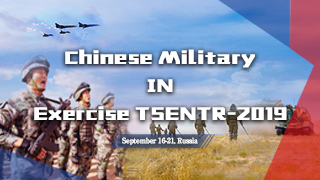By Jin Jingyi
Peacekeepers are a special force of justice. During the military parade celebrating the 70th anniversary of the founding of the People’s Republic of China, the peacekeeping phalanx, phalanx which appeared for the first time in national grand parade, was the only one that came in camouflage coats.
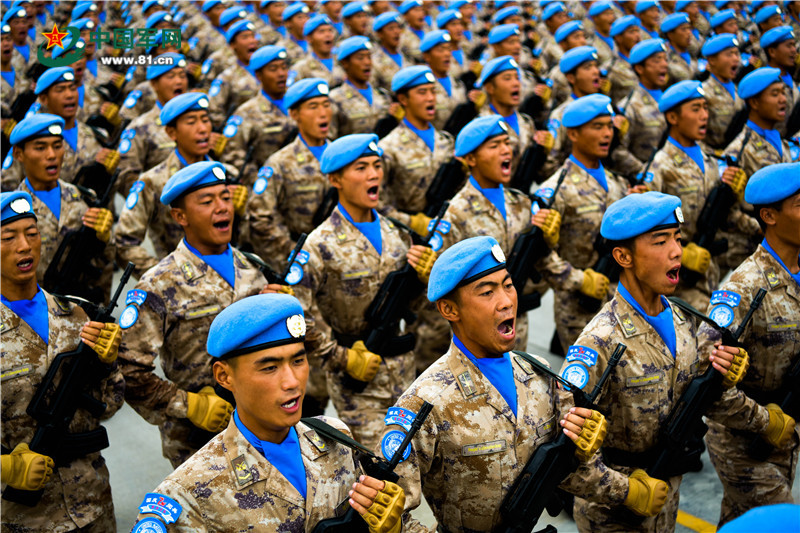
Red, blue and camouflage are the three basic tones of this phalanx. Red is the color of the national flag sewed on the left arm, symbolizing the peacekeeper’s firm conviction; blue is the color of their berets, kerchiefs and standard accessories, representing their lofty mission of safeguarding peace; and camouflage reflects their charm and confidence as a strong pioneering force.
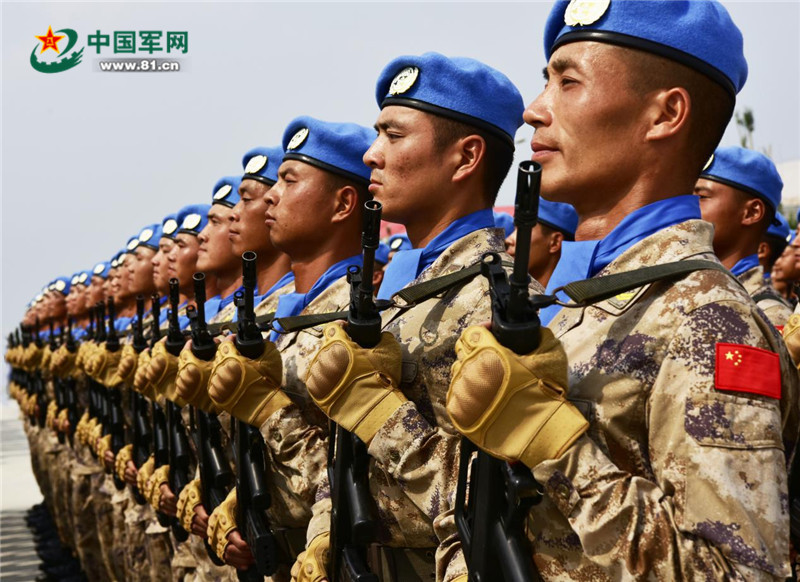
Coming from different cultures and language backgrounds, the UN peacekeepers have the common goal of protecting the disadvantaged and supporting those countries that try to move from conflict to peace. They not only safeguard world peace, but also represent the nation’s image overseas.
After completing their peacekeeping missions, the soldiers all said they loved the motherland even more and understood more deeply a soldier’s mission and a major country’s responsibility.
Ye Hui, a member of the phalanx, recalled his peacekeeping experience. He had never imagined that when he got off the plane, what awaited him was the empty street of Darfur, Sudan, with fresh bullet holes on the dilapidated walls. A few months before they arrived in Darfur, stray bullets hit a peacekeeping vehicle responsible for the refugee camp security during an armed conflict in another mission area in South Sudan, which claimed the lives of two Chinese peacekeepers. That was at the end of 2016 and the then commander of the peacekeeping contingent Wang Xing is also the head of the peacekeeping phalanx for now.
Death had never dampened the peacekeepers’ resolve to continue fighting in the poor, dangerous and war-stricken countries. The values of a soldier motivated them to head from their peaceful home in China to dangerous regions around the world, willing and ready to help bring peace to the people there.
As members of the engineer company, Ye Hui and his comrades spent most of their time helping the locals repair roads and bridges. A whole year in Darfur could be divided into only two seasons, the rainy season and the dry season. They had to finish all the work by the end of dry season because once the rainy season began, the continuous rain would ruin the repaired roads and make any construction work more difficult. The United Nations gave them three months to build a bridge, but they worked extra shifts and completed it ahead of schedule so that the bridge was put into use before the rain season arrived. The local residents were very fond of the industrious Chinese engineers because they always accomplished their tasks in advance. “China speed” is a mysterious combat force in the eyes of a foreigner, who could never understand what the mission means for the soldiers.
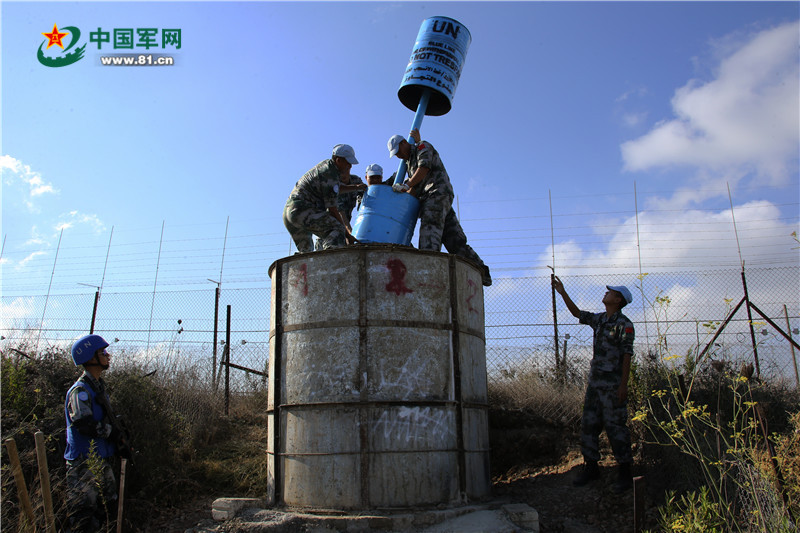
In the Democratic Republic of Congo, another peacekeeping mission area, even living necessities such as green vegetables and clean drinking water are a luxury. The cook Cui Xiangbiao learnt how to cook dishes without vegetables and make local meat products. When driving across the forest, he was deeply shocked by the poor little girls who surrounded their car asking for food. It was the first time that the soldier, who was responsible for ensuring food supply for the whole company, had such a direct and visual perception of hunger.
Also in that year, Ebola broke out in South Kivu province, the neighbor of North Kivu province, where the engineering company was carrying out a peacekeeping mission. All of a sudden the peacekeeping mission had a new outlook for Cui Xiangbiao. Being far away from home, homesickness, malaria and turmoil - reality far exceeded the imagination no matter how well-prepared you thought you were for danger and challenge. But it was exactly in those dangerous places that the mission became more sacred and the peacekeepers who never thought about retreating were more admirable and respectable.
The construction engineer Cao Zheng arrived in Lebanon in summer to help the locals build bunkers along the “Blue Line” on the Lebanon-Israel border. This work required huge amounts of construction materials, but since there was no convenient route of transportation, the engineers had to carry the materials from their barracks over a slope little by little. Not far from the bunkers was the mine field, where the Chinese mine sweepers who came to Lebanon together with them were busy clearing the mines. All of them bore in mind the national image of China and carried the soldiers’ responsibilities, in complete disregard of personal safety.
“Participating in peacekeeping missions and in the military parade are different experiences, but they both marked two peaks in my life,” said Ye Hui, with undisguised pride.
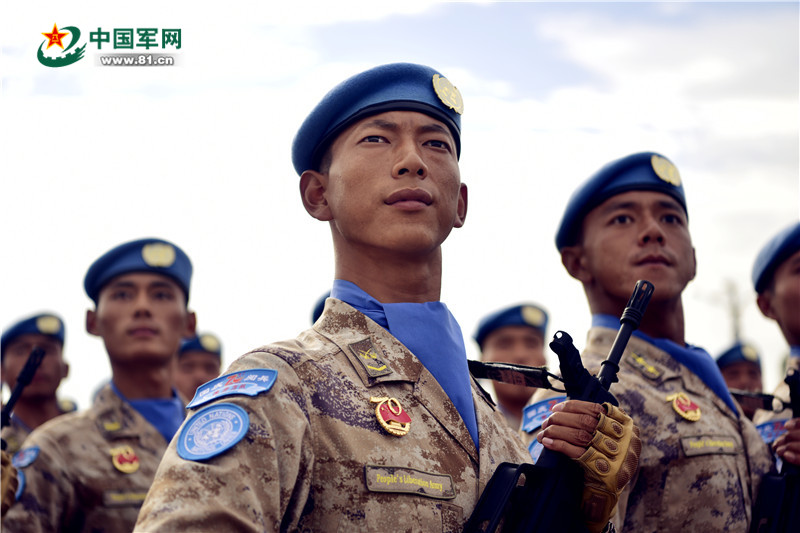
The peacekeepers’ patriotism was stimulated all over again by the military parade. They all felt lucky to be a part of this significant event because never have they imagined that they would have the opportunity to participate in the national grand military parade wearing their blue UN-labeled berets and peacekeeping uniforms. On the day of the parade, they walked past the Tiananmen in uniform steps, high spirits, and with full confidence.
Countless people watched this celebratory ceremony, including the Chinese and people all around the world, such as Lebanon, Democratic Republic of Congo, and Sudan.
Chinese peacekeepers have earned universal respect for their contributions to the world.
The appearance of the peacekeeping phalanx in the military parade demonstrated the Chinese military’s resolve and capability to safeguard world peace and regional stability, and the Chinese government’s unwavering support to the UN’s peacekeeping cause.

